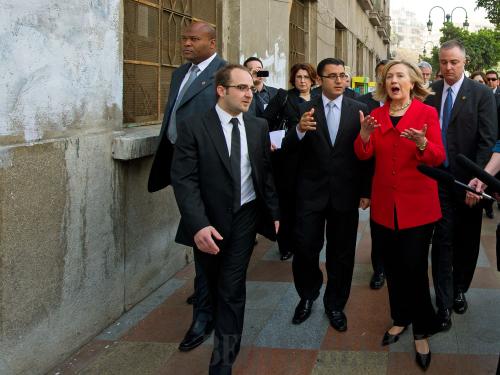|
 |
|
SHOWING SUPPORT: U.S. Secretary of State Hillary Clinton takes a walk in Cairo on March 16 during a visit to Egypt to meet new Egyptian leaders after former President Hosni Mubarak's resignation (XINHUA/AFP) |

Since the end of World War II, the United States has regarded the Middle East as one of its "unsinkable aircraft carriers." Every U.S. president has paid careful attention to the region, even during the Cold War. Following the disintegration of the Soviet Union, nearly all of the Middle East was under U.S. influence during the 1990s. However, recent turbulence has truly frustrated Washington and demonstrated the declining influence of the United States in the region.
There is something wrong with Washington's Middle East policy. The biggest mistake is the double standard applied to Arab countries and Israel—a practice that not only runs counter to basic principles set in place by the UN Charter, but also violates international standards of fairness and justice.
Failed strategies
The United States' hegemonic deeds in the Middle East helped tip the first dominos in the region. Growing anti-U.S. sentiment shows Middle East nations are losing trust in the United States. Arab leaders realized that neither maintaining a good relationship with the United States nor establishing a peace treaty with Israel could save them in the event of a crisis. In fact, severe political upheavals occurred in nations that typically maintain close ties with Washington.
After Egyptian President Hosni Mubarak resigned on February 11, the Egyptian Government allowed an Iranian fleet to head to Syria via the Suez Canal. Besides showing distance from the United States, this action indicated Egypt and the United States would deal with their bilateral relationship on equal terms.
U.S. counterterrorist warfare fans the flames for more acts of terror. The United States turns a blind eye to Israel's suppression of Palestinian demonstrators and militants. However, it classifies many Islamic groups such as Hamas, Hezbollah and the Muslim Brotherhood as terrorist organizations that it cannot wait to eliminate.
In the name of counterterrorism, Washington dispatched troops to Afghanistan and Iraq, and became ensnared by insurgencies in both nations. Former U.S. President George W. Bush sparked public outcry in the Islamic world by using terms like "Islamic terrorism." Although President Barack Obama promised to soften the U.S. stance, Muslims continue to die every day in U.S.-led counterterrorist combat operations in Islamic lands. Afghan President Hamid Karzai already required the United States and NATO to withdraw their troops.
The United States is always skewed in favor of Israel on the unsettled dispute between Palestinians and Israelis, which disappoints Arab people. The Palestinian-Israeli issue, the core of Middle East events, has become a complicated and difficult problem that has involved many nations over a long period of time. Now peace talks between the two sides have been shelved because Israel refuses to implement the "land for peace" agreement it has reached with its Arab neighbors. The United States considers Israel as a natural ally, and offers comprehensive support to Israel. It vetoed almost all anti-Israel bills at the UN. The United States has never pressed Israel hard enough on the Palestinian-Israeli issue.
An unintended result of U.S. antiterror operations in the Middle East was the rise of Iran. The United States toppled the regimes of Afghanistan and Iraq, which had long been Iran's archrivals. As it becomes stronger, Iran dares to say no to the United States. It has also forged anti-U.S. alliances with Syria, Hamas, Hezbollah and Iraqi Shiites. Now Iran is playing a more significant role in the Middle East.
Iran is pleased to have some of its own internal pressures relieved while Israel and the United States are vexed by instabilities in other Middle East nations. Besides, its relations with other countries in the region have been greatly ameliorated. Iran's Supreme Leader Ayatollah Ali Khamenei believes protests in Egypt, Tunisia and other countries were Islamic movements and such movements must be reinforced. Iran may be the biggest winner in the regional turmoil.
| 